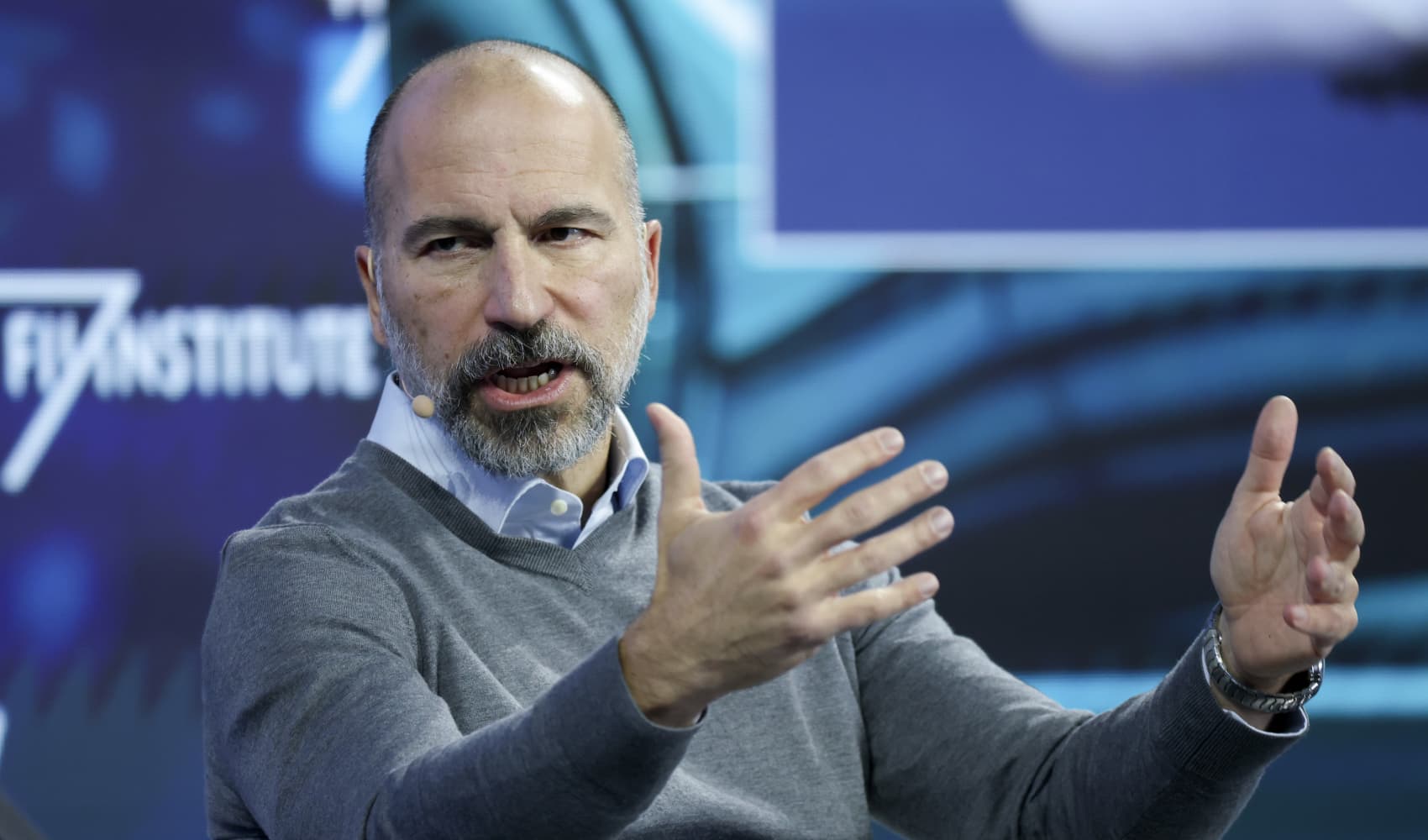Uber Mandates 3 Days In-Office: Remote Work Clawback?
Uber Shifts Gears: Mandates 3-Day In-Office Return, Reigniting Remote Work Debate
Introduction: The Ride Back to the Office
The pandemic era brought about seismic shifts in the way we work, and for many, remote work became the new norm. But as companies recalibrate and seek to recapture the pre-pandemic magic (or at least try to), some are pulling back on the remote work flexibility. Uber, the ride-hailing giant, is the latest to tighten its reins, requiring employees, even those previously approved for remote work, to return to the office three days a week. This move has sparked a wave of discussion – is it a necessary step to boost collaboration and innovation, or a step backward that disregards employee preferences and productivity?
The Memo Heard 'Round the Office: Khosrowshahi's Vision
According to a memo viewed by CNBC, Uber CEO Dara Khosrowshahi laid out the reasoning behind the increased in-office mandate. He emphasized the need for the company to be "great," not just "good." Was this a subtle jab at remote work's impact on performance, or a genuine belief that in-person collaboration is the key to unlocking Uber's next level of success? Only time will tell.
The Details: From Two Days to Three
The change, set to take effect in June, increases the in-office requirement from two days a week to three. This might seem like a small adjustment, but for employees who have structured their lives around remote work, it represents a significant disruption. It begs the question: how will this impact employee morale, and will Uber see a talent drain as a result?
Why the Shift? Decoding Uber's Strategy
The Collaboration Conundrum
Companies often cite collaboration as a primary driver for returning to the office. The argument is that spontaneous brainstorming sessions, water cooler conversations, and the general osmosis of ideas are more effective in a physical office setting. But is this a nostalgic view of collaboration, or a legitimate concern in the age of sophisticated remote collaboration tools? Let’s be honest, how many “spontaneous” brainstorms actually happen?
Maintaining Company Culture
Another common rationale is preserving company culture. Building a cohesive and unified team can be challenging when everyone is scattered. The thought is that in-person interaction fosters a stronger sense of community and shared purpose. Is it possible to maintain a strong culture with distributed teams? Many companies are proving that it is, but it requires intentional effort and creative strategies.
The Productivity Paradox
Productivity is a hotly debated topic in the remote vs. in-office debate. Some studies suggest that remote workers are more productive, while others indicate the opposite. Uber's decision may be based on internal data suggesting that in-office work boosts productivity, or perhaps simply a desire to have more control over the work environment. The truth likely lies somewhere in the middle, with individual productivity depending on factors like personality, job role, and home environment.
The Employee Perspective: Adapting to the New Normal (Again)
For many Uber employees, this change likely comes as unwelcome news. The flexibility of remote work has allowed for better work-life balance, reduced commuting stress, and increased autonomy. Having to readjust their schedules and routines can be a significant challenge. Will Uber offer any support or incentives to ease the transition, such as commuting stipends or enhanced office amenities? We can only hope so.
The Great Resignation: A Potential Risk?
In today's competitive job market, employees have more options than ever before. Companies that are too rigid with their return-to-office policies risk losing valuable talent to organizations that offer more flexibility. Could Uber's decision trigger a wave of resignations? It's a possibility they should seriously consider. Are they willing to risk losing top talent in pursuit of a perceived boost in productivity or collaboration?
The Tech Industry Trend: A Growing Movement?
Uber isn't the only tech company rethinking its remote work policies. Several other major players, including Google, Apple, and Amazon, have also implemented hybrid models or increased in-office requirements. Is this the beginning of a broader trend in the tech industry? It certainly seems that way. The race to get employees back to the office is on, but the long-term consequences remain to be seen.
Beyond the Bottom Line: The Human Cost of the Return
While increased in-office time may have benefits for the company, we can’t forget about the human impact. Commuting time, childcare expenses, and the loss of work-life balance can take a toll on employees' well-being. Companies need to be mindful of these factors and provide support to help employees adjust. Because, at the end of the day, happy employees usually equal happy customers.
The Future of Work: Hybrid is Here to Stay (Maybe?)
Even with companies like Uber increasing in-office requirements, the hybrid model is likely here to stay, at least for the foreseeable future. The pandemic has proven that remote work can be effective, and many employees value the flexibility it provides. The challenge for companies is to find the right balance between in-person collaboration and remote work flexibility. This "sweet spot" can vary significantly depending on the industry, company culture, and individual job roles.
Tools for Transition: Adapting to Hybrid Life
Embracing Technology
The move to a three-day in-office schedule requires a renewed focus on technology. This means investing in tools that facilitate seamless communication, collaboration, and project management, regardless of location. Think advanced video conferencing, shared document editing, and robust project tracking software. It's about creating a digital workspace that complements the physical one.
Creating a Purposeful Office Environment
If you’re dragging employees back to the office, you have to make it worth their while. Transform the office from a simple workspace into a hub for collaboration, innovation, and team building. Consider creating dedicated collaboration spaces, offering engaging in-office events, and providing amenities that make the commute worthwhile. The goal is to create an office environment that’s desirable, not dreaded.
The Role of Leadership: Leading by Example
For a return-to-office policy to be successful, it requires strong leadership. Managers need to lead by example, showing up to the office and actively participating in in-person activities. They also need to be empathetic and understanding of the challenges employees face in adjusting to the new schedule. Clear communication, consistent feedback, and a willingness to listen to employee concerns are essential for a smooth transition.
Measuring Success: Key Metrics to Watch
How will Uber measure the success of its increased in-office mandate? Key metrics to monitor could include: Employee satisfaction, employee retention rates, project completion rates, innovation output, and overall team collaboration. By tracking these metrics, Uber can gain insights into the impact of the new policy and make adjustments as needed.
The Long Game: A Sustainable Strategy?
The real test of Uber's decision will be its long-term sustainability. Will the increased in-office mandate lead to lasting improvements in productivity, collaboration, and company culture? Or will it ultimately alienate employees and hinder the company's ability to attract and retain top talent? Only time will tell if this is a strategic masterstroke or a misstep in the ever-evolving world of work.
Conclusion: Navigating the Hybrid Frontier
Uber's decision to increase in-office requirements highlights the ongoing debate about the future of work. While the company believes that this move will boost collaboration and drive innovation, it also raises concerns about employee morale and potential talent loss. As companies navigate the hybrid frontier, it's crucial to find a balance that meets the needs of both the organization and its employees. After all, a happy and engaged workforce is the engine that drives success.
Frequently Asked Questions
- Why is Uber increasing its in-office requirement?
Uber's CEO, Dara Khosrowshahi, stated the company needs to be "great," not just "good," suggesting the move aims to enhance collaboration, innovation, and overall performance through increased in-person interaction.
- Who does this new policy affect?
The new policy impacts all Uber employees, including those who had previously been approved for fully remote work. It requires them to be in the office three days a week.
- When does the new policy take effect?
The increased in-office requirement is scheduled to take effect starting in June.
- What if I have childcare or other personal obligations that make it difficult to come into the office three days a week?
It is recommended that you discuss your individual circumstances with your manager or HR department to explore potential accommodations or solutions.
- How will Uber measure the success of this new policy?
Potential metrics include employee satisfaction, retention rates, project completion efficiency, innovation output, and the level of team collaboration. These metrics will help Uber assess the impact of the new policy and make adjustments as necessary.


